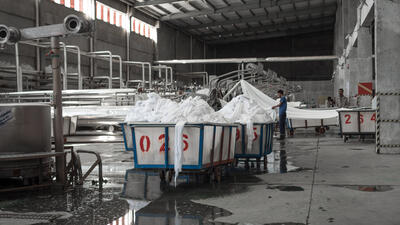¿Estamos preparando el entorno empresarial para el comercio y las inversiones? (en)
Since its first publication in 2008, the Global Enabling Trade Report, which is published by the World Economic Forum, has become a valuable reference tool for many countries in their efforts to increase trade and for many companies by allowing them to take better informed investment decisions.
At the core of the Report is the Enabling Trade Index (ETI), which was first developed within the context of the World Economic Forum’s Supply Chain and Transportation Industry Partnership program in 2008. The ETI measures the extent to which 132 individual economies across the globe have developed institutions, policies, and services facilitating the free flow of goods over borders and to destination.
The ETI is part of a collaborative effort between the World Economic Forum and private and public institutions, including the International Trade Centre (ITC).
Openness to multilateral trade
As part of a joint effort with the World Economic Forum, the Business Environment Section of ITC has utilized its knowledge and expertise on trade-related multilateral treaties and has developed the “The Openness to Multilateral Trade Rules Index”, an index that captures the extent to which countries’ regulatory environment is conducive to trade.
Included in the Index are indicators relating to general quality of governance and openness to foreign participation. The index is based on ITC’s Trade Treaties Map - LegaCarta system, which analyses the position of each country (accession/non-accession and incorporation/non-incorporation) and its utilization of some 280 multilateral trade rules (MTRs), as well as 450 protocols or amendments overseen by 28 different international organizations.
Out of the 280 multilateral trade treaties, ITC’s Business Environment Section has identified 40 core instruments of the ETI belong to seven categories (contracts, customs, dispute resolution, governance, intellectual property, investment, and air transport). The importance and relevance to trade of an instrument is determined by taking into account several criteria including: the impact of its provisions on international trade (reduction of transactional costs, trade facilitation, harmonization, transparency, predictability, creation of a business-friendly business climate, support of private-sector activities, and encouragement of foreign direct investment), and the opinion of international legal experts and the views of the international bodies administering these instruments.
Regulating the international sale of goods
The 1980 UN Convention on Contracts for the International Sale of Goods (CISG) provides a uniform regime regulating the international sale of goods. The Convention is directly applicable to contracts for the sale of goods concluded between parties having their main place of business in contracting States. For example, unless excluded by the parties, an international sale of textiles between a Chinese seller and a US buyer will apply the CISG as the law governing the sales contract because both China and the USA have ratified the CISG Convention. The same international transaction between a Chinese seller and a buyer from a country which had not acceded to the CISG will be governed by either countries domestic law, exceedingly complicating the situation. The CISG introduces certainty and predictability in commercial sales, reduces transaction costs and avoids unnecessary disputes.
Key findings
In the 2012 Global Enabling Trade Report, Singapore continues to lead the way on the Enabling Trade Index (ETI) by a wide margin, in comparison with Hong Kong (China), which took the number two position. According to the 2012 report, both economies continue to deliver a strong performance across all the components of the Index with open trade policies, excellent infrastructure, well-functioning border administration, and a business environment that is conducive to trade and investment. The third and fourth positions were taken by Denmark and Sweden, respectively, based on their strong business environment, efficient border administrations, and highly developed infrastructures.
Given that three of the top five positions were occupied by countries in the Asia and the Pacific regions, many countries in these regions have greatly benefited from trade and made it a central part of their growth strategy.
The Report suggests that although many countries in the Sub-Saharan Africa region have liberalized trade and are now enjoying important preferences in target markets, major improvements in trade facilitation have not been achieved because of lack of incentives to improve their business environment. As a result, it is more expensive to trade with Africa than with other regions.
Rwanda has been ranked 51st on the ETI 2012, the highest in this region, followed by Botswana at the 54th position. Both countries have implemented targeted business environment measures and improved rule of law for businesses and commercial operators. They have also enhanced their integration at global level trough new ratifications of key international trade treaties.
Given the relative size of its economy and despite of its well-developed infrastructure and efficient logistics services, South Africa is ranked 63rd in the world and only third within the region, after Rwanda and Botswana.
The fact that smaller countries are ranked higher than their larger counterparts in the region may not be a unique case for this region but rather a growing trend across the globe. While it is important to explore the reason behind the trend, it is critical to identify various effective technical measures that have the biggest impacts in enabling exports.
For further information, tool please contact:
Alexander Riveros (riveros [at] intracen.org ]
Trade Law Associate Expert, Business Environment Section
Division of Business and Institutional Support















